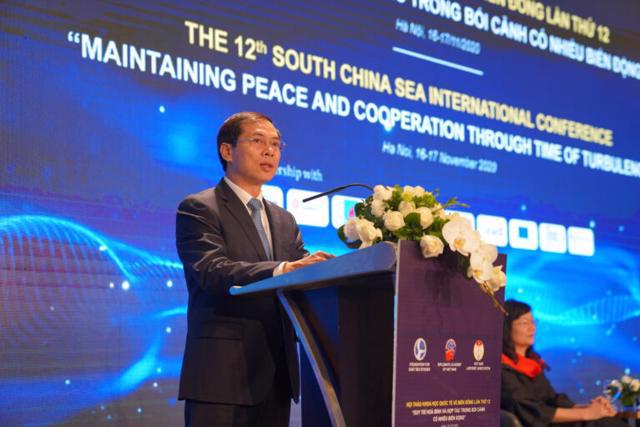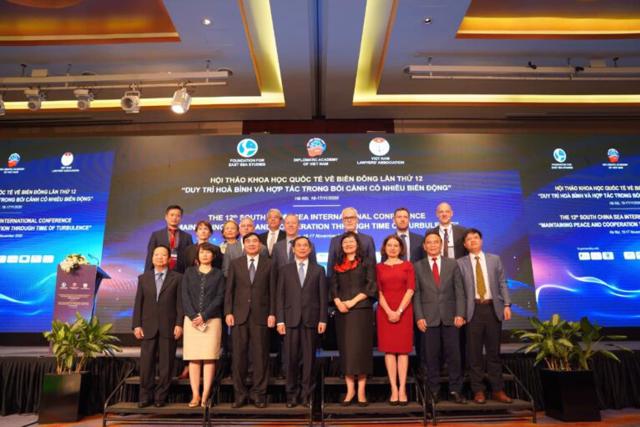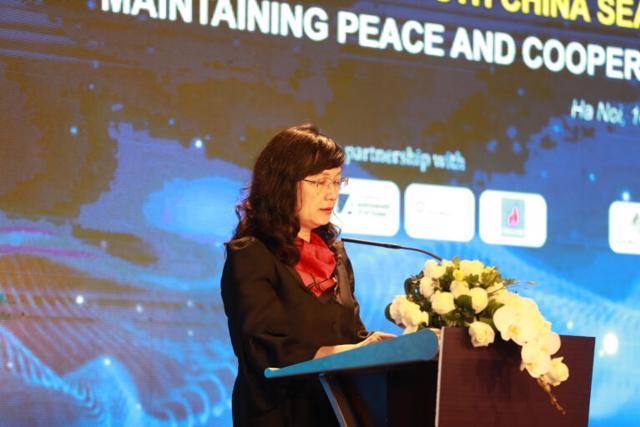


In his keynote speech at the Conference, Member of the Party Central Committee, Standing Deputy Minister of Foreign Affairs Bui Thanh Son assessed that the Covid-19 pandemic had caused a lot of confusion in international life, revealing several smoldering contradictions within societies and eroding trust among nations, thus leading to a negative impact on the environment of common peace and stability among countries. In that context, the South China Sea is a test for many important issues in international relations such as: the ability to maintain a dialogue between countries for the common interest, conduct of major countries and the protection of law and respect for international standards of conduct; the role of multilateral mechanisms in stress management, building trust, promoting cooperation, towards conflict resolution.
To overcome challenges in the East Sea issue, Mr. Bui Thanh Son raised the spirit of dialogue, promoting cooperation, mutual development and coming up with peaceful solutions to differences and disputes in the South China Sea based on international law. Relevant countries need to strengthen cooperation, turning the East Sea into the waters of Connection and Cooperation instead of Competition and Confrontation; enhance the construction and maintenance of a favorable environment for the promotion of maritime cooperation in the South China Sea; proactively prevent the risk of unwanted clashes at sea; promote cooperation for economic recovery and mutual development; cooperate in the protection of natural resources; strengthen marine scientific research and sustainable development in the South China Sea; constantly work towards the peaceful settlement of overlapping claims in the South China Sea in accordance with international law, especially the UNCLOS 1982.
Mr. Bui Thanh Son also emphasized that countries need to continue promoting ASEAN's central role in the regional security architecture, supporting ASEAN's Vision for the Indo-Pacific region, and agreeing on one ASEAN’s common strategic approach to regional maritime security issues. It is necessary to create favorable conditions for ASEAN and China to soon complete the negotiation of the Code of Conduct in the South China Sea (COC). The countries do not carry out unilateral activities, both military and civilian, to change the status quo in the South China Sea; continue to uphold and respect the integrity and unified and universal value of the UNCLOS 1982; consider this Convention as the legal basis for all activities at sea, and at the same time respect the legal rights based on international law of stakeholders in the South China Sea.

The conference consisted of 8 content sessions and 1 special session with the following topics: (i) The South China Sea issue in a volatile world situation; (ii) ASEAN's role with a post-2025 vision; (iii) Legal debates by Note Verbale at the United Nations; (iv) Competition for shaping public opinion on the South China Sea and the role of the media; (v) Codes of conduct development for collisions avoidance in the South China Sea; (vi) Fish resources, fisheries and protection of fish; (vii) Marine scientific research; (viii) Sustainable marine resources development; and the Special Session allowing young people to share their views on the South China Sea issue.
Regarding the situation of the South China Sea in the current world context, many opinions suggest that although it is difficult to find a direct link between the Covid-19 pandemic and the tense developments in the East Sea, Covid-19 makes the relationship worsening among major countries in the South China Sea, especially the US-China competitive relationship. Some participants said that China has taken advantage of the Covid-19 situation to increase the pace of operations in the field, expand control in the South China Sea and intentionally collide with many countries. China's basic objectives in the South China Sea have not changed, but recently China advocates to promote its position around the world, provoking a strong reaction from governments and people in many countries.
Meanwhile, the United States has maintained military operations and freedom of navigation. However, it has prominently been tougher on the diplomatic-legal front, directly opposing China's claims in the South China Sea. Many argue that this stance reflects the general policy trend of the US administration towards becoming more and more tougher on China. The US South China Sea policy has basically shaped clear under President Trump, so the upcoming administration will be less likely to make major strategic adjustments.
European speakers affirmed that the EU's increasing concern and presence in Asia in general and the East Sea in particular in recent times through strengthening security cooperation with ASEAN and Southeast Asian countries are because of the willingness to safeguard the international legal system, free trade, and regional rules-based order. However, on the other side, Chinese scholars argue that the "intervention" of European countries other than South China Sea coastal countries could make the situation more complicated.
Southeast Asian scholars have argued that ASEAN countries in general reacted to refrain from causing tensions beyond control in the South China Sea, while focusing on responding to the Covid-19 pandemic, maintaining supply chains and domestic economic recovery. However, many Southeast Asian countries such as Indonesia still firmly oppose China's claims in the South China Sea. ASEAN continues to promote multilateralism and its central role to maintain the position in the context of increasingly fierce competition among great powers, while striving to promote maritime cooperation on the basis of the international law, in which the UNCLOS 1982 is the legal basis for activities in the seas and oceans. It is suggested that ASEAN should optimize the principle of consensus, promote sub-multilateral mechanisms among key Southeast Asian countries, and share a common will for more effective regional cooperation. ASEAN also needs to build and strengthen its institutions to promote multilateral maritime cooperation in the context that multilateralism are facing many challenges in the world.
Discussing the debates by note verbales at the United Nations on the South China Sea issue and the future impact of the negotiation process of the Code of Conduct in the South China Sea (COC), many scholars affirm that the UNCLOS has universal and comprehensive values, which cover all matters at sea. All countries' Note Verbales directly and indirectly refer to the Arbitral Tribunal's Judgment in the 2016 South China Sea lawsuit, which opposes China's unreasonable maritime claims. The United Nations Commission on the Limits of the Continental Shelf has become the official repository of all note verbales and letters opposing China's unreasonable claims in the South China Sea.
In addition, scholars also assessed that note verbales and letters exchanged at the United Nations have made valuable contributions to clarifying and strengthening the legal stance of stakeholders. This is an important source of documents expressing the views of the claimants on the South China Sea issue. The note verbale debate is a formal, peaceful and transparent way of fighting as claimants gradually clarify their territorial and maritime claims in the South China Sea, and make them open to the public and countries around the world. This legal development can also be the basis of reference for the parties to the COC negotiation. In addition, some scholars also suggested that some countries with ASEAN that show similarities in many legal issues could proceed to a joint stance statement on the South China Sea.
Regarding the role of the media in shaping public opinion in the South China Sea, participants said that this competition for shaping public opinion has taken place on a wide scale and in many different forms. The media coverage of major countries from the perspective of nationalism can falsify information which is harmful to the promotion of cooperative management and peaceful settlement of disputes. Deliberately concealing information and providing false information can be counterproductive with governments. Scholars also recommend the public to consult information from official sources and collate sources of information to get the most scientific and authentic perspective on a hot political issue like the South China Sea.
On the issue of avoiding the risk of sea clashes, in recent years, there have been many unfortunate clashes between law enforcement forces of neighboring countries, especially in the exclusive economic zone and the continental shelf of coastal countries. Some marine scientific research activities, exploiting the resources of the countries in their own waters are often harassed. The risk of a sea clash in the coming time is increasing due to escalated competition between major countries. Therefore, the scholars propose a number of recommendations for relevant countries to avoid conflicts and reduce risks such as strictly complying with the 1982 UNCLOS Convention on the Law of the Sea, joining treaties and national agreements to reduce risks at sea such as COLREG, SUA and SOLAS. Since 2016, China and ASEAN have issued a joint declaration on the Code for Unplanned Encounters at Sea (CUES). However, up to now, CUES is still a voluntary code and only applies to naval forces. Therefore, the Australian scholar proposed to expand the scope of application of CUES to both marine police forces and civil law enforcement at sea.
One hot issue covered in the topic of maritime collision avoidance is China's Coast Guard Bill, which may include provisions allowing Chinese law enforcement to use force in the sea region of water claims. This bill has caused serious concern not only for regional countries but also for countries using the South China Sea because the implementation of the bill will threaten lives and property of fishermen of other countries and obstruct the freedom of navigation through the South China Sea. The Chinese scholar explains that this is an internal issue of China and that China has always pursued a traditional policy of friendship with neighboring countries in the South China Sea issue. However, many Indian, Japanese and Southeast Asian scholars continue to express concern over the bill, as China did not clarify the area of the sea applying the bill as well as the criteria to allow the Coast Guard to use force. Although some coastal countries also allow the Coast Guard to use weapons in certain situations, China's bill causes concern because of its arbitrary behavior towards other countries’ fishermen and ships over the past time.
In matters of fishing, marine environmental protection, marine scientific research, and sustainable marine economic development, participants also said that these areas need attention from countries as they are potential areas of cooperation with practical effects, showing the goodwill of countries to reduce tension, contributing to the process of building confidence in the region. At the same time, cooperation in these fields also contributes to meeting the common interests of people in the region in terms of environmental protection, sustainable development, etc. However, when it comes to promoting cooperation in all fields as mentioned above, participants said that they encountered many difficulties when proposing projects in the field, and at the same time, there appeared many sensitive factors in the cooperation process such as geographical location, organizational structure, finance and human resources etc. In addition, a number of ASEAN partner countries have recently proposed ideas and initiatives on cooperation "blue sea economy" with ASEAN, so it is difficult to avoid overlapping and complications among these initiatives. Delegates proposed to seek measures to synchronize these initiatives, including building multilateral maritime cooperation mechanisms of ASEAN and between ASEAN and partner countries to promote maritime cooperation.
At the invitation of the Organizing Committee of the Conference, Canadian Defense Minister Harjit Sajjan and Rear Adm. Juergen Ehle, Senior Advisor of the European Union Action Service (EEAS) gave important speeches at the Conference. Minister Harjit Sajjan emphasized that Canada has been ASEAN's dialogue partner for more than 40 years, attaching great importance to ASEAN's role in regional multilateral mechanisms. Canada unites unanimously with ASEAN in maintaining international order based on rules and international law, including the UN Convention on the Law of the Sea. Canada calls on all countries to comply with the LOS Convention. Canada opposes unilateral actions that escalate regional tensions and undermine stability in the South China Sea, oppose the use of force and the threat of force, large-scale island reclamation, building posts on disputed points and use them for military purposes. Canada urges all parties to comply with their commitments to demilitarize the points of disputes and commitments in the DOC Declaration, expecting a COC Code of Conduct that is based on international law and without prejudice to interests of third countries.
Admiral Juergen Ehle said security, safety and freedom of navigation is Europe's ultimate concern. The EU does not want illegal actions in the South China Sea to set a bad precedent for waters near Europe such as the Arctic Sea or the Sea of Azov. The EU emphasizes the universality and consistency of the Convention on the Law of the Sea, which is the legal framework for all activities at sea and ocean. The EU supports the development of a Code of Conduct in the South China Sea (COC) if the negotiation results are fair, reasonable and on the basis of harmonious interests of all stakeholders. Since 2018, the EU has had a common policy on promoting security cooperation with Asian countries, especially ASEAN, including maritime security cooperation, and hoped that this cooperation will become more and more practical. EU member states are also moving towards developing a unified approach to strategic issues for the Indo-Pacific region.
 This year, the 12th South China Sea International Conference was held for the first time in the form of an offline and online combination and has invited a record number of speakers, critics and attendees of the Conference. The sessions at this Conference are more practical, discussing urgent topics with the broader participation of policy makers, continuing to act as a better bridge between the official and semi-official channels to contribute to creating real changes, contributing to peace and cooperation in the South China Sea. For the first time, the conference invited many international journalists as speakers to discuss the role of the media in shaping public awareness of the South China Sea situation. The conference also devoted the first time to a special session for Young Leaders to create the next generation interested in promoting peace, stability and cooperation in the South China Sea. Scholars attending the conference also expressed their desire to meet face-to-face in Vietnam in the upcoming South China Sea conference series, when the pandemic passes./.
This year, the 12th South China Sea International Conference was held for the first time in the form of an offline and online combination and has invited a record number of speakers, critics and attendees of the Conference. The sessions at this Conference are more practical, discussing urgent topics with the broader participation of policy makers, continuing to act as a better bridge between the official and semi-official channels to contribute to creating real changes, contributing to peace and cooperation in the South China Sea. For the first time, the conference invited many international journalists as speakers to discuss the role of the media in shaping public awareness of the South China Sea situation. The conference also devoted the first time to a special session for Young Leaders to create the next generation interested in promoting peace, stability and cooperation in the South China Sea. Scholars attending the conference also expressed their desire to meet face-to-face in Vietnam in the upcoming South China Sea conference series, when the pandemic passes./.